No Posts
Sadly, there will be no posts for almost two weeks. Don't worry loyal followers readers, Thoughts on the World will be back after that.
Global warming, alternative energy and green tech news and analysis, with special green reports.
Sadly, there will be no posts for almost two weeks. Don't worry loyal followers readers, Thoughts on the World will be back after that.
Aquafina labels to give source: tap water
You can make a difference. It worked. That is amazing in its own way, but in a good way.PepsiCo Inc. will spell out that its Aquafina bottled water is made with tap water, a concession to the growing environmental and political opposition to the bottled water industry. According to Corporate Accountability International, a U.S. watchdog group, the world's No. 2 beverage company will include the words "Public Water Source" on Aquafina labels.
"Concerns about the bottled-water industry, and increasing corporate control of water, are growing across the country," said Gigi Kellett, director of the "Think Outside the Bottle" campaign, which aims to encourage people to drink tap water.
Texas leads list of dirtiest U.S. power plants
LOS ANGELES (Reuters) - Texas has the most entries on a list of the dirtiest U.S. power plants, while New England and the Pacific Coast make less carbon dioxide because they have fewer coal-burning plants, an environmental group said on Thursday.
Carbon dioxide (CO2) emissions is the main cause of greenhouse gases linked to global warming.
Of the 50 "dirtiest" power plants with the highest carbon dioxide emissions in the country, all are coal-fired. Texas accounts for five on the list, and Indiana and Pennsylvania each have four, the Environmental Integrity Project annual study found.
U.S. power plant CO2 emissions actually fell 2 percent in 2006 from 2005, but the report focused on the fact that a new wave of coal-fired plants -- about 150 nationwide -- could increase CO2 pollution by 34 percent by 2030, the study said.
I emailed Pepsi, and I recieved the following response:
Thank you for contacting us. In fact, we are in the process of clarifying our Aquafina label. We started discussions with Corporate Accountability earlier this year when they raised questions about Aquafina's labeling, and have shared those concerns directly with PepsiCo's CEO.
We have reviewed Aquafina's label with the goal of making it more clear and consistent about identifying the source of the water. We have decided to add the words "Public Water System" to clearly indicate the origin of the water. From there, Aquafina’s HydRO-7 purification system removes substances most other bottled waters leave in. What this means is that no matter where you buy your Aquafina, it tastes the same – every time, everywhere.
This change will occur over time as new labels are printed for Aquafina to avoid unnecessary waste of existing, pre-printed materials. Additional questions about Aquafina's sources can be directed to either Pepsi-Cola's tollfree Consumer information hotline or website at www.aquafina.com.
We appreciate your thoughts and want you to know we take your comments and the suggestions of Corporate Accountability very seriously.
Sincerely,
Elaine Palmer
Director, External Relations
PepsiCo, Inc.
Related posts:
• Pepsi Call-In Day - Take Action!
• 7 Facts You Never Knew About Bottled Water
• The Simplest and Most Effective Way to Reduce Your Carbon Footprint
• Bottled Water Miniseries
Pepsi Call-In Day– Tell Pepsi to get rid of their deceptive logo!
Do you know where your bottled water comes from? Probably not, because bottled water corporations like Pepsi, Coke, and Nestlé are reluctant to disclose this information. Instead, they prefer to use misleading branding to undermine confidence in public water systems and shape consumers perceptions of bottled water without revealing information about the sources or sites of the water they bottle. For example, the most popular bottled water brand, Aquafina, is just processed tap water, despite the image of the snow-capped mountain that appears on every label. That’s right; you could get virtually the same water out of your own tap for free!
Join Corporate Accountability International’s Pepsi Day of Action! Ask Pepsi when they will remove the misleading mountain logo on the Aquafina label and become transparent about the sources of the water they bottle. Pepsi is paying attention to this: now we need your help to step up the pressure! Every year, millions of dollars are spent to undermine the public’s faith in their municipal water systems. What we don’t realize, however, is that the water we get out of the tap is regulated far more than the bottled water we buy.
Think Outside the Bottle! Take action and join hundreds of people across the country in calling Pepsi today, in a joint Day of Action. Go to http://www.ThinkOutsideTheBottle.org/ for phone numbers and a script to help make your call faster and easier!
Thank you!
Background/What’s at Stake
Email to CEO Indra Nooyi at boardofdirectors@pepsi.com:
Dear Indra Nooyi,
The Aquafina Mountain label is misleading to consumers. The logo makes people think that the Aquafina water comes from a mountain spring, yet in reality it is purified municipal water. I want to know when Pepsi is planning to remove the logo as a step toward revealing the sites and sources of the water used for bottling.
I am joining other people around the country who believe water is a fundamental human right that must not be turned into a for-profit commodity. I urge your corporation to reveal the sources and sites of water used for bottling, publicly report breaches in bottled water quality, comparable to reports by public water systems, and stop threatening local control of water when sing and operating bottled water plants.
Thank you for your prompt response to this important issue.
Sincerely,
Please let Corporate Accountability know what happened
After you call, please take a moment to let Corporate Accountability know what happened. You can report your phone calls by calling Campaign Headquarters at 800-688-8797 or by sending an e-mail to activistnetwork@StopCorpoateAbuse.org.
Corporate Accountability International is a membership based organization that for 30 years has been protecting people around the world from dangerous and irresponsible corporate practices. For more information on Corporate Accountability International, go to http://www.StopCorporateAbuse.org/.
City, State:__________________
Date:____________________
Length of Call: ______ minutes
Time:____________ AM/PM
DID YOU …
•Get Put on Hold • Get a Busy Signal • Get Disconnected
•Spoke with Rep - What did they say? (Please be specific! Use additional page, if necessary.) Name of person you spoke to: _________________
Person's title: ____________________________
Person's department: _______________________
Thank-you for taking action - let us know about your call!
E-mail your reporting form to activistnetwork@stopcorporateabuse.org or call 800.688.8797.
Related posts:
• Pepsi Response - Bottled Water
• 7 Facts You Never Knew About Bottled Water
• The Simplest and Most Effective Way to Reduce Your Carbon Footprint
• Bottled Water Miniseries
Ice keeps New York office towers cool
As the summer swelters on, skyscrapers and apartments around the city will crank up air conditioners and push the city's power grid to the limit -- but some have found a cool alternative.
Some office towers and buildings are keeping their AC use to a minimum by using an energy-saving system that relies on blocks of ice to pump chilly air.
"If you take the time to look, you can find innovative ways to be energy efficient, be environmental and sustainable," said William Beck, the head of critical engineering systems for Credit Suisse.
The systems save companies money and reduce strain on the electrical grid in New York, where the city consumes huge amounts of power on hot summer days.
Ice cooling also cuts down on pollution. A system in Credit Suisse's offices at the historic Metropolitan Life tower in Manhattan is equal to taking 223 cars off the streets or planting 1.9 million acres of trees to absorb carbon dioxide from electrical use for a year, according to the New York State Energy Research and Development Authority.
Such a reduction in pollution is valuable in a city where the majority of emissions come from the operation of buildings. Officials said there are at least 3,000 ice-cooling systems worldwide.
Because electricity is needed to make the ice, water is frozen in large silver tanks at night when power demands are low. The cool air emanating from the ice blocks is then piped through the building. At night the water is frozen again and the cycle repeated.
Check out my post at Environmental Graffiti: Stop That F*****g Junk Mail by Going Green.
Hope you like that picture.
Hungary heatwave kills hundreds
Up to 500 people have died in the past week from a heatwave in Hungary, a top health official has said.
Anna Paldy, deputy director of the National Institute of Environmental Health, told the BBC that the figure included 230 deaths in central Hungary.
The deaths - from 15 to 22 July - were caused by heatstroke, cardiovascular problems and other illnesses aggravated by the heat, she said.
Some 30 people have also died in the heatwave in neighbouring Romania.
Humans to blame for global changes in rain: study
WASHINGTON (Reuters) - Human activities that spur global warming are largely to blame for changes in rainfall patterns over the last century, climate researchers reported on Monday.
The report was released as record rains caused deadly flooding in Britain and China.
Human-caused climate change has been responsible for higher air temperatures and hotter seas and is widely expected to lead to more droughts, wildfires and floods, but the authors say this is the first study to specifically link it to precipitation changes.
"For the first time, climate scientists have clearly detected the human fingerprint on changing global precipitation patterns over the past century," researchers from Environment Canada said in a statement.
The scientists, writing in the journal Nature, found humans contributed significantly to these changes, which include more rain and snow in northern regions that include Canada, Russia and Europe, drier conditions in the northern tropics and more rainfall in the southern tropics.
Decoding Mushroom's Secrets Could Combat Carbon, Find Better Biofuels And Safer Soils
Researchers at the University of Warwick are co-ordinating a global effort to sequence the genome of one of the World's most important mushrooms - Agaricus bisporus. The secrets of its genetic make up could assist the creation of biofuels, support the effort to manage global carbon, and help remove heavy metals from contaminated soils.
The Agaricus mushroom family are highly efficient 'secondary decomposers' of plant material such as leaves and litter -breaking down the material that is too tough for other fungi and bacteria to handle. How exactly it does this, particularly how it degrades tough plant material known as lignin, is not fully understood. By sequencing the full genome of the mushroom, researchers hope to uncover exactly which genes are key to this process. That information will be extremely useful to scientists and engineers looking to maximize the decomposition and transformation of plant material into bio fuels.
The mushroom also forms an important model for carbon cycling studies. Carbon is sequestered in soils as plant organic matter. Between 1-2 giga tons of carbon a year are sequestered in pools on land in the temperate and boreal regions of the earth, which represents 15-30% of annual global emissions of carbon from fossil fuels and industrial activities. Understanding the carbon cycling role of these fungi in the forests and other ecosystems is a vital component of optimizing carbon management.
Reuters: A box to make biofuel from car fumes
This is very, very promising. The only question is whether this magic 'box' is energy efficient.
QUEENSFERRY (Reuters) - The world's richest corporations and finest minds spend billions trying to solve the problem of carbon emissions, but three fishing buddies in North Wales believe they have cracked it.
They have developed a box which they say can be fixed underneath a car in place of the exhaust to trap the greenhouse gases blamed for global warming -- including carbon dioxide and nitrous oxide -- and emit mostly water vapor.
The captured gases can be processed to create a biofuel using genetically modified algae.
Dubbed "Greenbox", the technology developed by organic chemist Derek Palmer and engineers Ian Houston and John Jones could, they say, be used for cars, buses, lorries and eventually buildings and heavy industry, including power plants.
"We've managed to develop a way to successfully capture a majority of the emissions from the dirtiest motor we could find," Palmer, who has consulted for organizations including the World Health Organisation and GlaxoSmithKline, told Reuters.
The three, who stumbled across the idea while experimenting with carbon dioxide to help boost algae growth for fish farming, have set up a company called Maes Anturio Limited, which translates from Welsh as Field Adventure.
CBSNews: Eco-Vandals Attack Hummer In D.C.
On Monday, two masked men were seen taking a bat to every window [of the Hummer], knifing each tire and scratching a message into the body — "For The Environ."
"The thought of somebody vandalizing it never crossed my mind," Groves, who lives in an upscale northwest Washington neighborhood with his mother, told the Washington Post. "I've kind of been in shock."
"I'd say one in five people who come by have that 'you-got-what-you-deserve' look," said friend Andy Sexton, 27, who is visiting from Arkansas and has been helping Groves deal with fallout from the crime, told the Post.
Police say they haven't seen vandalism so severe with a clear political message in recent years. Investigators say they don't have many leads.
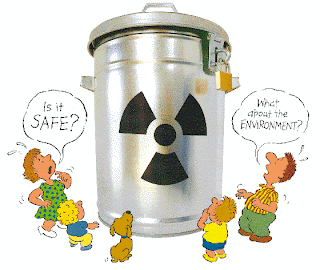 A while back, there was a post here at Thoughts on Global Warming about nuclear power. It concluded with this paragraph:
A while back, there was a post here at Thoughts on Global Warming about nuclear power. It concluded with this paragraph:
Nuclear power, if used carefully, could power most of the world’s energy needs. Of course, it wouldn’t be able to power all needs (i.e. cars). France can be a role model—80% of energy consumed there is nuclear. In contrast, 20% of energy consumed in the U.S. is nuclear. Nuclear energy, along with other non-fossil fuels could power the future.Maybe it’s time to take another look at that.
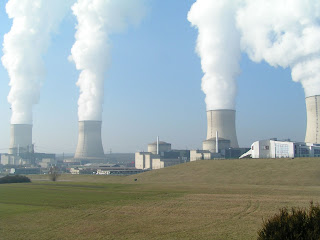 It’s interesting to note that coal-burning plants put more radioactive waste into the environment than nuclear plants. Still, nuclear plants produce more solid waste.
It’s interesting to note that coal-burning plants put more radioactive waste into the environment than nuclear plants. Still, nuclear plants produce more solid waste.
Posted by
Simmons
at
4:34 PM
0
comments
![]()
Labels: Alternative Energy, Alternative Energy Series, Global Warming, Nuclear Power, Special Report



This is an interesting graph from the New York Times, comparing bottled water and tap water along with other drinks: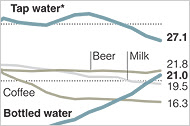
Bottled water is a huge waste of resources and time. It also contributes to global warming.
I'm not completely sure this would work, but it's a great idea. I thought the carbon cycle ensures that there is always the same amount of CO2 on Earth, wherever it is (i.e. 'in' oil).
Scientists invent device to stop Global Warming
Chemists at the University of California, San Diego have created a device that uses sunlight to transform harmful CO2 gas into fuel that could replace all the gasoline used in transportation.
Clifford Kubiak, professor of chemistry and biochemistry and Aaron Sathrum have developed a prototype device that can capture energy from the sun, convert it to electrical energy and “split” carbon dioxide into carbon monoxide (CO) and oxygen.
The amazing process produces CO (carbon monoxide) which can be processed by bacterial fermentation to produce ethanol, and massive amounts industrial chemicals used to produce plastics. By splitting CO2 you can save fuel, produce useful chemicals and eliminate global warming greenhouse gases.
The device designed by Kubiak and Sathrum to split carbon dioxide utilizes a semiconductor and two thin layers of catalysts. It splits carbon dioxide to generate carbon monoxide and oxygen in a three-step process. The first step is the capture of solar energy photons by the semiconductor. The second step is the conversion of optical energy into electrical energy by the semiconductor. The third step is the deployment of electrical energy to the catalysts. The catalysts convert carbon dioxide to carbon monoxide on one side of the device and to oxygen on the other side.
The US uses about 400 million gallon of gasoline a day and produces about 50 million tons of CO2. The goal now is to scale this process up to replace that amount of gasoline and convert most of the manmade CO2 gases in the US.
Reuters: Rooftops key to Florida green energy goal
A new initiative by the fourth most-populous U.S. state to get its utilities to generate 20 percent of their power from sun, wind and other renewable resources will mean wiring rooftops rather than building huge solar or wind farms.
Utilities say large solar power plants would simply not be cost effective.
"The cloud cover in Florida limits the amount of power that can be produced," said Mayco Villafana, a spokesman for Florida Power & Light, the state's largest electricity company.
But Florida has plenty of sunshine to power rooftop solar panels and renewable energy advocates are urging the state to help residents create thousands of mini power plants in their homes.
Gov. Charlie Crist announced this week that he wants utilities to generate one-fifth of their electricity from renewables to combat global warming -- joining several other states that have adopted measures to reduce greenhouse gases in the absence of action by the federal government.
Posted by
Simmons
at
7:29 PM
0
comments
![]()
Labels: Alternative Energy, Global Warming, News, Solar Power



Wind power is much like solar power; it’s a renewable resource, it’s pollution free during use, it can be stored locally, etc. But that means it also has many of the same disadvantages that solar power has—it’s not always there, during construction it may require fossil fuels, etc. But wind power and solar power combined together could be extremely useful.
Usually when the sun is shining, it’s not very windy. When the sun isn’t shining, generally it is windy. Think about it. During storms when the sun is covered up (see picture), it is usually very windy. If wind power and solar power were united, energy could be produced almost continuously. One way this could be accomplished is by putting solar panels in the same area as wind turbines. Because of the massive size of wind turbines, they take up great swaths of land. The land in between the turbines should be used for agricultural purpose, some people have suggested. Instead, imagine putting solar panels in between them. The power produced would be enough to fuel many houses.
Think about it. During storms when the sun is covered up (see picture), it is usually very windy. If wind power and solar power were united, energy could be produced almost continuously. One way this could be accomplished is by putting solar panels in the same area as wind turbines. Because of the massive size of wind turbines, they take up great swaths of land. The land in between the turbines should be used for agricultural purpose, some people have suggested. Instead, imagine putting solar panels in between them. The power produced would be enough to fuel many houses.
Wind power does have its disadvantages.
• Is it sunny or windy more often? Probably sunny.
• Some people find wind turbines “ugly”.
• The amount of wind can’t be accurately predicted.
• The wind isn’t constantly blowing.
• Wind turbines need some form of energy to be produced. Sometimes fossil fuels are used.
Overall, wind power combined with solar is promising. But once again, as said in 5 Reasons Solar Power Works, all alternative energy sources have to be combined with other energies to realistically power the world.
More Alternative Energy Series:
Why Corn Ethanol is Bad
The Temporary Solution: Coal
Nuclear Power: Energy of the Future or As Bad As Fossil Fuels
5 Reasons Solar Power Works
The Wind Power and Solar Power Combination
Another Look at Nuclear Power - Nuclear Waste
What's So Special About Hydropower and Hydroelectricity?
Top 5 Advantages of Geothermal Power
Posted by
Simmons
at
7:06 PM
0
comments
![]()
Labels: Alternative Energy, Alternative Energy Series, Global Warming, Special Report, Wind Power



Enjoy!
Alternative Energy Mega Projects
I’m going to say it straight off the bat; I’m a greenie, I love my bike above all other modes of transport, our Earth is going to hell in a hand-basket, and it’s the rich and industrialized nations of the world that are doing it to us! My kids, and my kids' kids future may already be irrevocably screwed!.. That political statement out of the way though, I want to take a look at the latest alternative-energy projects , and how they can ensure our living on Earth without gills for as long as possible.Ocean Waves Could Power the Entire Planet
The ocean occupies 70% of the earth’s surface and the waves that occur in them have the highest energy density. That means in a relative small area substantial energy can be generated making it the most viable and virtually inexhaustible energy source.
As our energy needs rise, as our supplies of fossil fuels run out and as the state of our planet become more precarious, we increasingly need to look at alternative energy sources to meet our requirements and to allow our modern lifestyles. Each of the methods below has been touted both a possible solution and as an environmentally friendly oneJobs in Alternative Energy Industries are Taking Off
There has never been a better time for an alternative-energy-loving TreeHugger to get a job, according to a story at internet job-finder Monster.com. We've been asked about this before, and have touched on getting a good job that does good as well.45 things we can do to save the environment
Here is a nice slideshow of 45 things that we can do to save the environment.Global Warming Will Spark War
A number of recent studies have highlighted the danger that global warming could spark resource wars. One study, to be published in the August edition of Human Ecology, evaluated correlations between war and climate change between the years 1000AD and 1911AD. The study found that the occurrence of war was in sync with times of agricultural problems due to fluctuations in global temperature. With the UN warnings that desertification could displace up to 50 million does this mean war?
The ocean holds 300 times the energy requirement of our population worldwide. The ocean stores 1,000 times more heat than the atmosphere. Most of this heat are contained in the upper layer of tropical oceans. OTEC uses this continuously renewing energy to generate electricity without oil, coal or natural gas. It only uses the temperature difference of the hot surface water and the cold deep water.
Posted by
Simmons
at
8:21 PM
0
comments
![]()
Labels: Alternative Energy, Global Warming, Hydropower, Solar Power, Special Report, Wind Power



Global warming is a serious threat to not only the United States of America, but to humanity as a whole. If the Earth heats to the dangerous level it is expected to, more than our national security is at stake. But the homeland will come under fire if something is not done to slow global warming. Droughts are becoming increasingly common, as are heat waves. The fight for water in poorer nations, such as those in Africa, is only aggravating conflicts there. As we saw around the turn of the century, countries in turmoil spawn frustrated, angry people that can turn in die-hard terrorists willing to do anything. Global warming has to be slowed.
Placing a small carbon tax on emissions will not amount to much to the average consumer, but it will to big emitters. They will realize that they must invest in renewable energy or nuclear power. Carbon taxes are one flat tax that is predictable and easy to implement. And the tax revenue, which will be a decent amount, can be used for research into renewable energy and nuclear power.
CNN: Ford sees plug-in hybrids in 5-10 years
ROSEMEAD, California (Reuters) -- Ford Motor Company Chief Executive Alan Mulally says he expects the company to sell plug-in hybrids in five to 10 years.
"Within five to 10 years we will start to see this technology in our hands," Mulally said on the sidelines of a press event to announce an alliance between Ford and utility Southern California Edison to test 20 rechargeable electric vehicles.
When asked if that meant plug-in hybrids would be available on showroom floors, Mulally said, "Yes. Sure."
From CNN: Natural-gas guzzler
The new natural-gas-powered Honda Civic GX uses domestically produced fuel -- the same stuff your gas stove burns -- that costs as little as one third the price of gasoline. The American Council for an Energy-Efficient Economy calls it the cleanest-burning internal-combustion vehicle on Earth.
[...]
But the recent release of the Phill home-refueling station, manufactured by Toronto-based FuelMaker, changes things. Now people who have the station installed at their house can refuel the GX overnight, since the system taps into natural-gas lines.
There are many potential benefits to using natural gas: It's the cleanest-burning fuel available, with virtually zero emissions; it's a domestic fuel source; and, when using the home station, fuel costs drop to approximately $1.30 per gallon.
FuelMaker, which developed the home-refueling system with support from Honda, provided a Phill unit for our year-long test and installed it at automotive editor Eric Adams's residence in New Jersey. Honda provided the Civic GX.
Although the retail cost of Phill is roughly $4,000, the final cost to consumers can be significantly lower, because (depending on where you live) state and federal tax credits can offset or even completely cover the initial purchase price.
Similar tax credits can offset the incremental cost of the natural-gas technology in the Civic, bringing the $24,000 purchase price -- again, depending on your state -- down to below that of the entry-level Civic's $16,000 sticker.
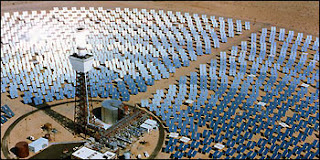 When most people think about solar power powering everybody’s everyday needs (say that 10 times fast), they are imagining centuries in to the future. Many people believe solar power is unreasonable; it could be cloudy, it doesn’t produce enough energy, etc. But they’re wrong. Here are five reasons why:
When most people think about solar power powering everybody’s everyday needs (say that 10 times fast), they are imagining centuries in to the future. Many people believe solar power is unreasonable; it could be cloudy, it doesn’t produce enough energy, etc. But they’re wrong. Here are five reasons why:
1. It never runs out
Solar power is essentially infinite, so it never runs out, unlike fossil fuels. The amount of solar energy intercepted by the Earth every minute is greater than the amount of energy the world uses in fossil fuels each year.
2. It’s pollution free during use
Converting solar energy into usable energy gives off no pollution.
3. It can (but doesn’t have to) be used locally
Not only can solar power can be produced and used locally, saving transportation costs and emissions, but also it can be used nationally if an area with little power needs more power (see #4).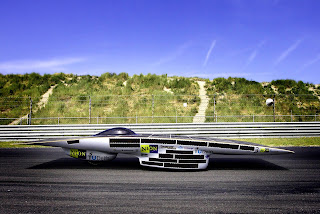
When the sun’s not out, stored energy can be used. Storing energy is more expensive, but still just as useful.
5. When combined with other technologies, solar power could be even more useful.
From Time:
In the developing world, LEDs paired with solar panels could provide a cheap, sustainable light source that doesn't need a traditional power grid.
From CNN:Solar-powered sensors monitor traffic flow
Combined with other technology, solar power could be used for small but important jobs. Solar powered cars (see picture) are even a possibility, even if their use would be limited.
In reality, solar power may not provide enough energy for ALL of our energy needs. But it could provide be a large percentage energy source. Coupled with nuclear power, wind power and water power, we could stop global warming. And as an added bonus, the U.S. with lose its dependency on foreign oil.
More Alternative Energy Series:
Why Corn Ethanol is Bad
The Temporary Solution: Coal
Nuclear Power: Energy of the Future or As Bad As Fossil Fuels
5 Reasons Solar Power Works
The Wind Power and Solar Power Combination
Another Look at Nuclear Power - Nuclear Waste
What's So Special About Hydropower and Hydroelectricity?
Top 5 Advantages of Geothermal Power
Posted by
Simmons
at
8:22 PM
5
comments
![]()
Labels: Alternative Energy, Alternative Energy Series, Global Warming, Solar Power, Special Report


